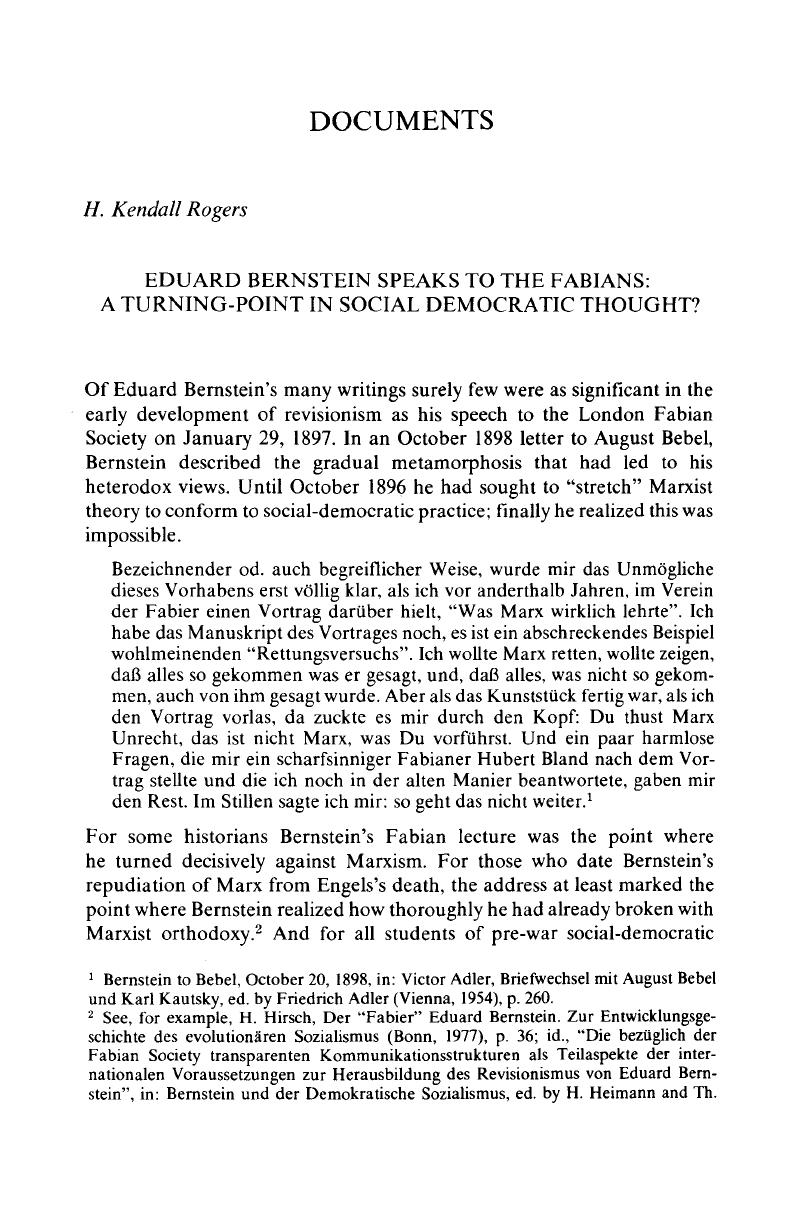Article contents
Eduard Bernstein Speaks to the Fabians: A Turning-point in Social Democratic Thought?
Published online by Cambridge University Press: 18 December 2008
Abstract

- Type
- Other
- Information
- Copyright
- Copyright © Internationaal Instituut voor Sociale Geschiedenis 1983
References
1 Bernstein to Bebel, October 20, 1898, in: Victor Adler, Briefwechsel mit August Bebel und Karl Kautsky, ed. by Adler, Friedrich (Vienna, 1954), p. 260.Google Scholar
2 See, for example, Hirsch, H., Der “Fabier” Eduard Bernstein. Zur Entwicklungsgeschichte des evolutionären Sozialismus (Bonn, 1977), p. 36;Google Scholar id., “Die bezüglich der Fabian Society transparenten Kommunikationsstrukturen als Teilaspekte der internationalen Voraussetzungen zur Herausbildung des Revisionismus von Eduard Bernstein”, in: Bernstein und der Demokratische Sozialismus, ed. by Heimann, H. and Meyer, Th. (Bonn, 1978), P. 51;Google Scholar and Meyer, Th., Bernsteins konstruktiver Sozialismus. Eduard Bernsteins Beitrag zur Theorie des Sozialismus (Bonn, 1977), pp. 32f. and particularly note 132, p. 33.Google Scholar
3 Hirsch, , Der “Fabier” Eduard Bernstein, pp. 121–23.Google Scholar
4 Bernstein, , “Karl Marx and Social Reform”, in: The Progressive Review, II (1897), pp. 140–54. The article is reprinted with its numerous inconsistencies.Google Scholar
5 Bernstein, , “;Sozialistische Oekonomie in England”, in: Die Neue Zeit, XV (1896–1897), 1, pp. 46–54.Google Scholar
6 Kautsky Papers DV 384, Internationaal Instituut voor Sociale Gesehiedenis.
7 See, for example, Anon, . [Bernstein], “Die Agitation gegen die türkische Misswirthschaft”, in: Vorwärts, 29 09 1896, p. 3.Google Scholar
8 Kautsky Papers C 148.
9 Belfort-Bax, E., “Die materialistische Geschichtsauffassung”, in: Die Zeit, VIII (1896), p. 20, note.Google Scholar
10 H. Kanner, “Kleine Gernegrosse”, ibid., pp. 193–95; Shaw, G. B., “Socialism at the International Congress”, in: Cosmopolis, III (1896), PP. 658–73.Google Scholar
11 Kautsky Papers DV 385 and 388.
12 Hirsch, , Der “Fabier” Eduard Bernstein, p. 35, note 43, and p. 36.Google Scholar
13 Kautsky Papers DV 412.
14 Compare Bernstein's criticism of Bertrand Russell for discovering a contradiction between the theory and practice of German Social Democracy only because Russell misunderstood Marxism to begin with. This is in Bernstein, , “Die deutsche Sozialdemokratie in englischer Beleuchtung”, in: Die Neue Zeit, XV/1, pp. 433–35.Google Scholar
15 See my doctoral dissertation. “Before the Revisionist Controversy: Kautsky, Bernstein, and the Meaning of Marxism, 1895–1898” (Ph.D. diss., Harvard University, 1984).Google Scholar
16 See, for example, Liebknecht, W., “Erklärung”, in: Vorwärts, 11 11 1896, p. 4;Google Scholar Luxemburg, R., “Zur Orientpolitik des ‘Vorwärts’”, in Gesammelte Werke (Berlin, 1970-1975), I/1, pp. 69–73;Google Scholar Bernstein, , “Die deutsche Sozialdemokratie und die türkische Wirren”, in: Die Neue Zeit, XV/l, pp. 112–15; and Kautsky to Bernstein, 10 7, 1896, Kautsky Papers C 151. In this letter Kautsky explained: “Meiner Ansicht nach ist die alte Marxsche Orientpolitik unhaltbar geworden.” The change in Bernstein's thinking marked by the Fabian speech was reflected in his letter to Kautsky on 03 10, 1897, where Bernstein argued that Marx was originally mistaken on the Eastern Question. This latter letter is in the Kautsky Papers DV 406.Google Scholar
17 These opening paragraphs probably did not appear in the original speech; rather, Bernstein added them for publication. Apparently Bernstein began his Fabian address by stating bluntly that Marx's writings had been read in a biased fashion. Academics claimed he was a genius only to inflate their own importance for tearing him to pieces. However, the Marx whom these intellectuals ridiculed and whom fanatic socialists praised was in fact a straw man, a caricature of the true Marx. Since the false understanding of Marxism had advocates as well as opponents, it was important to find out just what Marx had really taught. Though this had been misunderstood in respect both to theory of history and to economics, Bernstein felt he had time only for the former. Accordingly, he deleted a presentation on Das Kapital, Vol. III, which might have followed his recent attack on Hyndman's economics.
18 Here Bernstein apparently deleted a passage from the original speech which suggested that the British labor movement might be more radical if an earthquake swallowed men like Shaw and Webb, Haldane and Dilke – members of the non-proletarian classes who nonetheless sought to serve working-class interests.
19 As other reasons for the peculiar development of class conflict in England, in his original speech Bernstein here mentioned emigration and the need for capital to conquer new worlds before it was finished.
20 Here the original speech probably ended. Apparenly, the following paragraph was added to conclude the published article.
- 1
- Cited by


